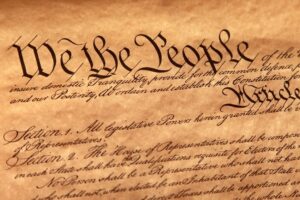Does The Constitution Let Ron DeSantis Block Me On Twitter? Or Mike Johnson? Or...
The list really does go on.

Aren’t you glad it applies to public schools too?
One of the best functions on social media sites like Xitter, Instagram, and Facebook is the block button. You see one of your former students? Block. Proselytizing about how Bitcoin and NFTs are about to come back in a big way? Block. Demanding that you double space after a period? Block and report.
Besides dropping social media entirely, few things help protect your mental health quite like curating who gets to interact with you. I especially love blocking politicians — besides Mar-a-Lago and Prison, Donald Trump will have a comfortable home on my block list for years to come. But if by some act of God he becomes president again, can he block me back? SCOTUS could decide that question soon enough. From Bloomberg Law:

How Savvy Lawyers Build Their Law Firm Rate Sheet
The US Supreme Court will consider how to adapt current free speech protections to social media accounts where public officials interact with constituents when the justices return for arguments this week.
In a pair of cases to be heard Tuesday, the justices will decide if those officials run afoul of the First Amendment when they block individuals on social media accounts that highlight both professional and personal affairs.
Approaching the question naively, of course the Constitution doesn’t speak a word about a politician’s right to block a constituent on Twitter — the way you’d block tweeting at the time of the founding would have been shutting the windows or getting a cat. But if we think about social media as our contemporary town square — which it probably is — blocking constituents looks a lot more like state censorship:
Any time a public official creates a forum, there are going to be limits on what they can do to restrict criticism, said Gregg Leslie, the executive director of the First Amendment Clinic at Arizona State University’s law school. “That used to mean something out in public—in a park or a public building.”
Social media is no different, said Leslie, who filed an amicus brief in support of those challenging the blocking of private individuals. “It really doesn’t have to be seen as revolutionary.”
As public figures, it will be interesting to see how the SCOTUS members rule on the matter. My guess is that Barrett is pro block button — big fan of anything that gets her a little bit closer to the glory days when justices weren’t accountable to the public. That goes double for Kavanaugh after his Morton’s escape and quintuple for Thomas after the last 25 years or so of being publicly criticized and paid under the table.
Sponsored

Not All Legal AI Is Created Equal


A Law Firm Checklist For Successful Transaction Management


How To Build And Manage Your Law Firm Rate Sheet

A Law Firm Checklist For Successful Transaction Management

If the Court rules that public figures can’t block their constituents, I’ll definitely be taking Trump off the block list just to read his prison meltdown tweets. I’m sure it will be legendary.
Justices Consider Who Public Officials Can Block on Social Media [Bloomberg Law]
 Chris Williams became a social media manager and assistant editor for Above the Law in June 2021. Prior to joining the staff, he moonlighted as a minor Memelord™ in the Facebook group Law School Memes for Edgy T14s. He endured Missouri long enough to graduate from Washington University in St. Louis School of Law. He is a former boatbuilder who cannot swim, a published author on critical race theory, philosophy, and humor, and has a love for cycling that occasionally annoys his peers. You can reach him by email at cwilliams@preprod-atl.staging.breakingmedia.com and by tweet at @WritesForRent.
Chris Williams became a social media manager and assistant editor for Above the Law in June 2021. Prior to joining the staff, he moonlighted as a minor Memelord™ in the Facebook group Law School Memes for Edgy T14s. He endured Missouri long enough to graduate from Washington University in St. Louis School of Law. He is a former boatbuilder who cannot swim, a published author on critical race theory, philosophy, and humor, and has a love for cycling that occasionally annoys his peers. You can reach him by email at cwilliams@preprod-atl.staging.breakingmedia.com and by tweet at @WritesForRent.
Sponsored

How Savvy Lawyers Build Their Law Firm Rate Sheet








